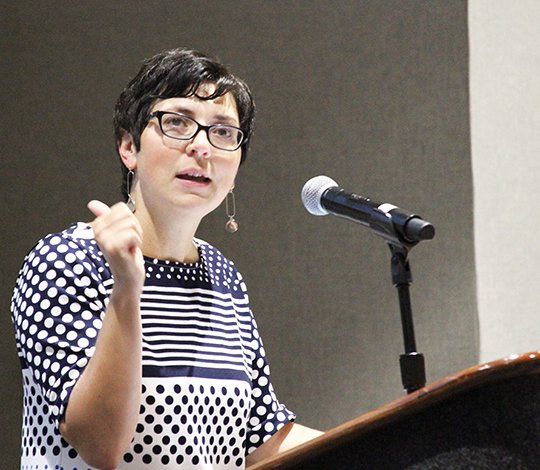Child sex trafficking is a multimillion dollar business and the fastest-growing criminal enterprise, the president of a group created to combat the problem told Arkansas school counselors on Tuesday.
Angelyn McMurray, president of We Are Free, a nonprofit based in Hope that takes action against human trafficking, told counselors gathered for the Arkansas School Counselor Association's 2018 convention at the Hot Springs Convention Center about the importance of implementing education about human trafficking and prevention in the education system.
"Ninety-nine percent of trafficked children won't get out of their teen years, but many of those teens are in the school system; we are just failing to see them," McMurray said.
She said the average trafficker can earn up to $10 million through their network of trafficked students or children.
"Let's change the way we think about this problem, not just numbers on a board, but the fact that this is happening in my community," she said. "We have kids that may be coming to school every day, but throughout the night they are being raped anywhere between 10 to 12 times and that becomes their existence."
She shared anecdotes of affected children and warning signs varying from abuse to mental health issues.
"We don't want to just continue being the Band-Aid and helping heal the problem, but we also want to be focused on the prevention of human trafficking," McMurray said.
"Trafficking has changed from that older creepy guy that's lurking at the playground or you see on 'Dateline.' That guy is now paying a younger 19-year-old to do their recruitment or the 19-year-old is now the online predator," she said.
Human trafficking affects 40 million victims globally, lowers victims life expectancy by seven to 10 years and occurs at a faster rate in rural areas than urban areas, according to statistics McMurray shared from the Polaris project.
With 170 reported cases of trafficking from 2013-17 in Arkansas, McMurray stressed that the numbers are tough to pinpoint, but shared tips and advice on identifying warning signs in youth.
"It's almost like an anthill -- you see just a couple of ants at the top, but then beneath there is a huge intricate system of people that are involved and affected," she said.
McMurray said victims of the sex trafficking industry are often children in foster care or runaways. Currently, one out of every six runaway children in the United States is likely to be a sex trafficking victim.
"These individuals are not dumb criminals, they are smart and are changing the game on us. We as a culture have to get on board with how to continue prevention," McMurray said.
She shared information from PROTECT, a California nonprofit that developed an anti-trafficking protocol and Common Core curriculum for fifth- to 12th-graders. McMurray said she is currently working with the Arkansas state Legislature to adopt the curriculum in public schools.
Local on 07/12/2018